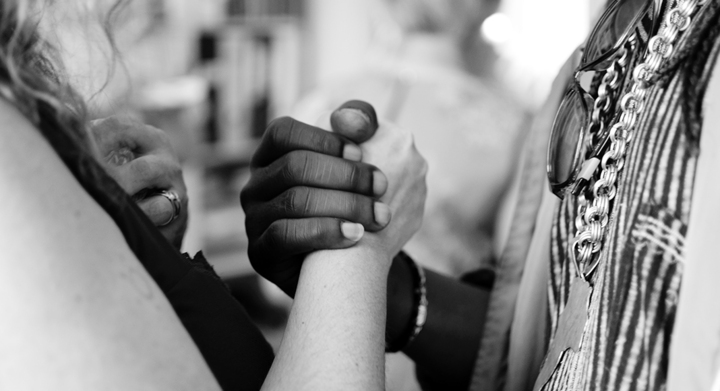
As we continue our national conversation in which we wrestle with issues surrounding social justice, violence against African Americans, and the polarization taking place in our social and political discourse, one thing is clear: we all have much to learn, and a posture of humility and openness towards others is a necessary ingredient in our pursuit of discipleship to Jesus Christ. That is certainly true of The King’s University (TKU), which has throughout its history worked to build bridges of denominational unity, ministry opportunity for women, understanding between Jews and Gentiles, and racial reconciliation.
On the latter issue, TKU’s founder, Pastor Jack Hayford, was a catalyst for racial reconciliation as a leading pastor in Los Angeles in the early 1990s. The 1992 Los Angeles Uprising, also known as the L.A. Riots, broke out in that city after a trial jury acquitted four LAPD policemen of using excessive force in the arrest and beating of an African American man, Rodney King, after they had been widely seen doing so on television and other media. After a week of riots, 63 persons died, more than 2300 were injured, over 12,000 arrests were made, and more than a billion dollars in property damage occurred. A devastated city needed pastoral care, leadership, and a model of unity and reconciliation. Pastor Jack, who pastored The Church On The Way, teamed up with Pastor Kenneth Ulmer from Faithful Central Bible Church and Pastor Lloyd John Ogilvie of Hollywood Presbyterian Church to offer hope to a hurting and divided city, modeling and cultivating unity and reconciliation across racial lines. They also publicly and privately committed themselves to lifelong friendship, accountability, and prayer for one another.
Pastor Jack was a key participant two years later in the formation of the Pentecostal/Charismatic Churches of North America (PCCNA), an organization founded on racial reconciliation. In 1994, the “Memphis Miracle” took place, when in a gathering of African American and white church representatives, white pastors and leaders publicly repented of racism and exclusivism in their Pentecostal church organizational and fellowship activities. Leaders repented, a spontaneous and prophetic foot-washing service took place, and a long-overdue embrace and reconciliation began. An exclusively white Pentecostal interdenominational organization was dissolved, and the PCCNA was formally established, continuing its work to the present day. This new organization, whose motto is “Demonstrating Unity in the Power of the Spirit,” has an ongoing commitment to multi-racial leadership, a welcome to women in ministry, and a place for both denominational Pentecostals and independent charismatics to gather in mutual work and support. A key moment in the historic Memphis meetings was a prophetic word delivered by Pastor Hayford. (Read historian Vinson Synan’s documentation of the Memphis Miracle, including Pastor Jack’s entire prophetic utterance.)
Three years later, another word from the Lord led Pastor Jack to establish what is now The King’s University in 1997. Building relationship across racial lines has been a hallmark of TKU from the beginning. Pastor Jack’s close friend and colleague, Dr. Kenneth Ulmer, became a founding board member of TKU, and later served as TKU’s president. Throughout TKU’s 23-year history, Dr. Ulmer (who continues to pastor Faithful Central Bible Church and is widely recognized as an apostolic leader in Los Angeles and across the nation) has taught courses on racial reconciliation, and the Ministry of Reconciliation course he developed and teaches is required of all Master of Divinity students. Dr. Ulmer also launched and continues to teach at TKU’s annual Oxford Experience which takes place in England each summer, and his courses there over the years have often been transformative gatherings that focus on racial reconciliation.
TKU’s connection to the PCCNA has also been maintained and expanded over the years. TKU has continuously supported PCCNA’s Statement of Faith, and TKU is currently a parachurch member of the organization. TKU’s Provost, Dr. David Cole, currently serves as chair of PCCNA’s Christian Unity Commission. And in 2016, TKU hosted the PCCNA annual meeting. A highlight of the week’s activities was the TKU chapel service. At that gathering a panel of leaders ministered to students and faculty which included executive leaders Bishop Charles Blake (Church of God in Christ), Dr. George Wood (Assemblies of God), Rev. Sammy Rodriguez (National Hispanic Christian Leadership Conference) and Rev. David Wells (Pentecostal Assemblies of Canada).
Like TKU, the PCCNA has much more to accomplish and is working to respond to the challenges faced in today’s Church and society (To see recent public statements in response to our current racial crisis by a broad cross-section of PCCNA leaders, visit A Call for Unity in North America). But as leaders gather—both men and women, from different denominations and church networks, from every ethnic background, and from Canada, Mexico, and the United States—building bridges of mutual support and cooperation for the sake of the gospel, much hope is being extended to churches and communities as we seek the healing that can only come from the Holy Spirit. Similarly, under the direction of President Chasteen, TKU intends to be a community that models and cultivates those priorities as we learn to listen, learn to love those different from us, and prepare to be ministers of reconciliation to a hurting world.